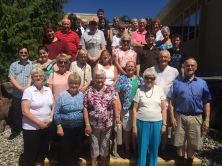By the Rev. Dr. Ed and Janice Hird
We fell in love forty years ago, and have never looked
back. With three adult sons and two
grandchildren, we are so grateful for the gift of family. This past summer has been a time of family
reunions for many of us. We deeply
appreciated the opportunities to hang out with our family members, particularly
those who live far away.
 Most families are complicated and messy. Reconnecting with our family members during
the summer can be challenging for many people. Setting boundaries with people that we love is
never easy. Saying no to our family
members, even when necessary, can sometimes be really hard. Even Jesus, who was
never unloving, had problems at times with his family. He said that sometimes there would be painful
division even within our families. Jesus
said that family cannot be the ultimate, but rather a penultimate very high priority. He said that if we sought first God’s
kingdom, then everything would go better, including our relationships with our
family.
Most families are complicated and messy. Reconnecting with our family members during
the summer can be challenging for many people. Setting boundaries with people that we love is
never easy. Saying no to our family
members, even when necessary, can sometimes be really hard. Even Jesus, who was
never unloving, had problems at times with his family. He said that sometimes there would be painful
division even within our families. Jesus
said that family cannot be the ultimate, but rather a penultimate very high priority. He said that if we sought first God’s
kingdom, then everything would go better, including our relationships with our
family.
One time Jesus was so involved with helping people that he
did not have time to eat. This so upset
his family and friends that they decided that he must be out of his mind. In some cultures, skipping a family meal is almost
unforgivable. Eating three square meals
a day is on the same level for some families as following the Ten Commandments
or the Golden Rule. Because there was
such a large crowd, his mother and brothers could not even reach Jesus. You can imagine how their anxiety level would
have been spiking.
In the midst of family anxiety, Jesus had a very clear idea
of who he was and what he was called to do.
This gave him the courage to say no to his family, when they were trying
to stop his important work. He said the
shocking phrase: “Who is my mother? And
who are my brothers?” If we said that
with our families, they would not likely be pleased. They might say back to us, “What are you
talking about, Ed and Janice? We are
your family. We were there at your
wedding thirty-eight years ago.” Jesus
went on to memorably say “ My family, my mother , brothers and sisters are
those who do the Father’s will”. Family
for Jesus is bigger than just the physical nuclear family. Jesus dearly loved his nuclear family, but he
had to remind them that even our family cannot come first in our lives. This is not an easy lesson to learn, because
we love our families so dearly. Our
prayer for those reading this article is that we may learn to celebrate the
gift of family in a way that still allows us the freedom to say no, to set
healthy boundaries.

The Rev. Dr. Ed and Janice Hird
-author of Restoring Health: body, mind and spirit










PortrtMay14.jpg)


